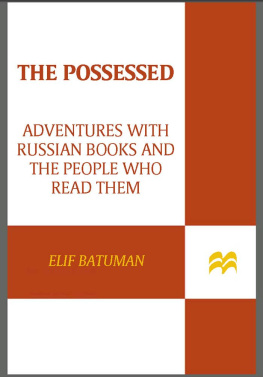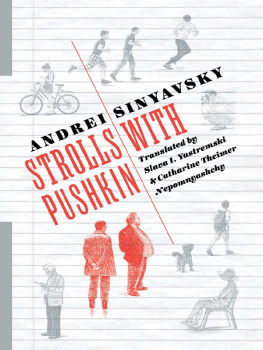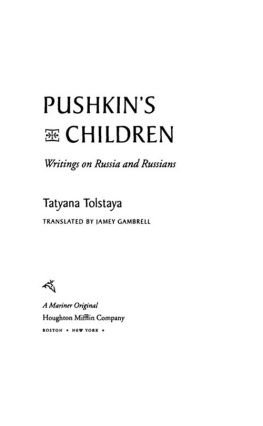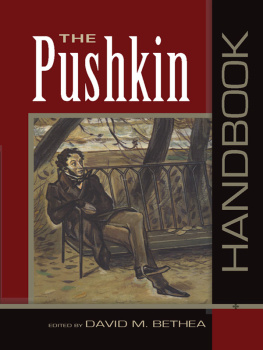
ELIF BATUMAN
The Possessed
E LIF B ATUMAN was born in New York City and grew up in New Jersey. She now lives in San Francisco. She is the recipient of a Rona Jaffe Foundation Writers Award. She teaches at Stanford University.
The Possessed
The Possessed
ADVENTURES WITH RUSSIAN BOOKS
AND THE PEOPLE WHO READ THEM
Elif Batuman
FARRAR, STRAUS AND GIROUX NEW YORK
Farrar, Straus and Giroux
18 West 18th Street, New York 10011
Copyright 2010 by Elif Batuman
All rights reserved
Distributed in Canada by D&M Publishers, Inc.
Printed in the United States of America
First edition, 2010
Some of these essays have appeared, in slightly different form, in Harpers Magazine, n+1, and The New Yorker.
Library of Congress Cataloging-in-Publication Data
Batuman, Elif, 1977
The possessed : adventures with Russian books and the people who read them / Elif Batuman.1st ed.
p. cm.
ISBN 978-0-374-53218-5 (pbk. : alk. paper)
1. Russian literatureAppreciation. I. Title.
PG2986 .B33 2010
891.7'09dc22
2009025416
Designed by Jonathan D. Lippincott
www.fsgbooks.com
1 3 5 7 9 10 8 6 4 2
Contents
The Possessed
Introduction
In Thomas Manns Magic Mountain, a young man named Hans Castorp arrives at a Swiss sanatorium to visit his tubercular cousin for three weeks. Although Castorp himself does not have tuberculosis, he somehow ends up staying in that sanatorium for seven years. The plot of The Magic Mountain mirrors the history of its composition: Mann set out to write a short story, but ended up producing a 1,200-page novel. Despite the novels complexity, its central question is very simple: How does someone who doesnt actually have tuberculosis end up spending seven years at a tuberculosis sanatorium? I often ask myself a similar question: How does someone with no real academic aspirations end up spending seven years in suburban California studying the form of the Russian novel?
In The Magic Mountain, it all happens because of love. While visiting his cousin, Castorp becomes infatuated with another patient: the estranged wife of a Russian officer. Her high cheekbones and her gray-blue Kirghiz-shaped eyes recall to him a childhood fascination with Slavicnessspecifically, with an idolized older boy at school, from whom the hero once, in the happiest moment of his life, borrowed a pencil. The Russian ladys eyes, in particular, amazingly and frighteningly resemble those of this schoolboy; indeed, Mann emends, resembled was not the right wordthey were the same eyes. Under their mesmerizing influence, Castorp is seized by a passion to learn about samovars, Cossacks, and the Russian language, colorfully characterized by Mann as the muddy, barbaric, boneless tongue from the East. One afternoon, Castorp attends a lecture titled Love as a Pathogenic Force, in which the sanatorium psychoanalyst diagnoses his entire audience as so many victims of love: Symptoms of disease are nothing but a disguised manifestation of the power of love; and all disease is only love transformed. Castorp recognizes the truth of this lecture. He ends up so terribly in love with the married Russian woman that he develops a fever and appears to have a damp spot on one of his lungs. This real or imagined damp spot, combined with the hope of glimpsing his beloved at mealtimes, is what keeps him on the Magic Mountain.
Of course, there are many differences between my story and that of Hans Castorp. But there are also similarities. The seven years I ended up spending in the Stanford comparative literature department were also a matter of love, and fascination with Russianness. This love was also prefigured during my schooldays by a chance encounter with a Russian person, and developed in an institutional setting.
The first Russian person I ever met was my teacher at the Manhattan School of Music, where I studied the violin on Saturdays. Maxim wore black turtlenecks, played a mellow-toned, orange-colored violin, and produced an impression of being deeply absorbed by considerations and calculations beyond the normal range of human cognition. Toward the end of one lesson, for example, he told me that he had to leave ten minutes earlyand then proceeded to spend the entire ten minutes unraveling the tortuous logic of how his early departure wasnt actually depriving me of any violin instruction. Tell me, Elif, he shouted, having worked himself up to an almost amazing degree. When you buy a dress, do you buy the dress that is the most beautiful... or the dress that is made with the most cloth?
Another time, Maxim instructed me to listen to a particular Soviet recording of the Mozart violin concerti. Sitting in a wooden library carrel, I listened to all five concerti in a row: a fluid, elegant performance, with passages of singing intensity through which one seemed to glimpse the whole cosmic pathos of Mozarts life on earth. But as I listened, I found myself distracted by the CD case, by the slightly blurred three-quarters photograph of the soloist, who looked literally indistinguishable from my violin teacher. The stiff posture, the downturned mouth, the intent and melancholy eyebrowseverything was the same. His name was even Maxim, although he had a different surname.
The following week, Maxim specifically asked whether I had noticed anything unusual about the violinist.
Like what? I asked.
Well, lets say, his appearance. In Moscow, at the conservatory, people used to say that he and I looked alike... very much alike. More than the brothers.
Actually, yeahI did sort of notice that from the photograph.
At this innocuous remark, an expression of gloom descended upon him, as abruptly as if someone had dropped a black cloth over his head. Its nothing, nothing, he said, sounding almost angry.
Probably the strangest episode with Maxim involved the yearly juried examinations at the music school. In the weeks before the exams, Maxim was constantly changing his mind about which tudes and scales I should prepare, even telephoning me once in the middle of the night to announce a change in plan. We have to be very well prepared because we do not know who is on this jury, he kept saying. We do not know what they will ask you to play. We can guess, of course, but we cannot know.
When the day of the juries came, I was called into the examination room, with its grand piano and long table, at the head of which, presiding over two more junior faculty members, sat not some unknown judge, but Maxim himself.
Hello, Elif, he said pleasantly.
Such mystifications can have a very strong effect on young people, and this one was compounded by the circumstance that I had just read Eugene Onegin, and had been particularly moved by Tatyanas dream: the famous sequence in which Pushkins heroine finds herself crossing a snowy plain, surrounded by sad murk, and pursued by a bear. The bear scoops her up and Tatyana loses consciousness, waking up as the bear deposits her at the end of a hallway where she hears cries and the clink of glasses, as if at some big funeral. Through a crack in the door she sees a long table surrounded by reveling monstersa dancing windmill, a half crane, a half catpresided over, as she realizes with inexplicable horror, by none other than Eugene Onegin.
Tatyanas dream is fulfilled in waking life at her name-day party: an ill-fated event during which Onegin, motivated apparently by nothing but boredom, breaks Tatyanas heart and fatally quarrels with his young friend Lensky. (By the time Onegin falls in love with Tatyana, years later in Moscow, its too late. She still loves him but is married to an old general.) I read
Next page









